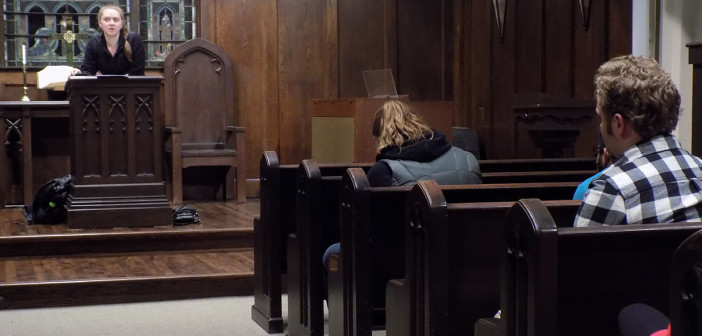Laura Ebsworth, a sophomore musical theatre major, suffered from dozens of allergic reactions during the 2014-2015 academic year.
“It severely affected my well-being, and I was sick all the time,” she said.
The situation became so severe that she tried to find off-campus housing for the 2015-2016 school year. She wanted to be off the meal plan and have the ability to prepare her own food. Unfortunately, her options fell through at the last minute and she had to live in the Residence Hall/Recreation Center, in a dorm with no kitchen.
Being an out-of-state student, Ebsworth had it harder than many others. “I am in no position to commute to campus, and I can’t go home on the weekends to eat,” she said.
Two months after her housing decision was finalized, Ebsworth was on the phone with a friend voicing her angst about dining on campus.
“The connection was bad so my friend was having trouble understanding me,” Ebsworth said. “It frustrated me to the point where I just got onto social media, created a Facebook group, and advertised it and my cause on every NCC page I could find.” Within the first two weeks, Ebsworth gained 50 members.
This was the beginning of a new club on campus: the Food Allergy/Dietary Restrictions Association. Abbreviated and known as FADRA, it was started in July 2015. Now, the club is working for their cause full time. Several new officer positions were filled just a couple of weeks ago.
FADRA’s main goal is to improve and standardize dietary accommodations on campus. Ebsworth said that, sometimes, the school just doesn’t realize how much needs to happen.
“We want to make dietary accommodation information as easily accessible and as common knowledge as registering for classes,” she said.
Ebsworth is working with the Dean of Students office, Res Life and ITS to create a dietary survey so that Chartwells knows the exact numbers of students with food allergies and dietary restrictions that they will cater for.
FADRA is also working with students who have religious dietary restrictions, and with the vegan/vegetarian student population.
The club’s new religious correspondent, sophmore Asma al-Odaini, is a computer science major and also a member of the Muslim Student Association.
“As the number of students with religious dietary restrictions increased, it was important to add this section to FADRA,” said al-Odaini. “Before FADRA, it was hard for such students to get the assistance they needed because they didn’t have an organized way of doing it.”
Al-Odaini said FADRA is taking note of students with religious dietary restrictions and conveying their needs to the dining administration on campus.
FADRA’s hands-on approach to making changes on campus is what makes it stand out from the large number of clubs already established.
“We have set up active partnerships between the Dean of Students Office, the Office of Residence Life, Chartwells, The Office of Student Involvement and the Dyson Wellness Center, and we are continuing to look at expanding our partnerships throughout the school year,” said Ebsworth.
The club has gained a lot of supporters ever since fall term started. A number of people signed up to be on the mailing list and their club meetings have also been a success. The club’s vice president and psychology major, Anna Ferrone, said that almost everyone she talks to has heard about the club.
“Most students are aware that additional menu items are being added because of FADRA’s initiatives,” Ferrone said. “It’s so great that the college is recognizing that the allergy population on campus is high in number.”
“I am gluten intolerant and this group seemed like it could help the college cater to my needs,” said Sarah Mayhew, a junior and an international student from England who has taken an interest in the club. She has been able to find a few gluten-free options at Kaufman, but not a lot at the Cage. “By bringing awareness to the fact that this is an issue on campus, I believe the group can help make some changes for all of us.”
Now that FADRA has given a voice to students with food allergies and dietary restrictions, the college is responding.
“There are going to be some major changes happening over D-term; students will see a lot of changes when they come back from winter break,” said Ebsworth. She is planning on staying on campus during D-term to oversee said changes.
A few modifications will have to be installed during the winter and spring terms. Ebsworth is confident that all of the changes FADRA has requested thus far will be installed by the end of this academic year.
“College students have so much on their minds; food should be the last thing we have to think about,” Ebsworth said

